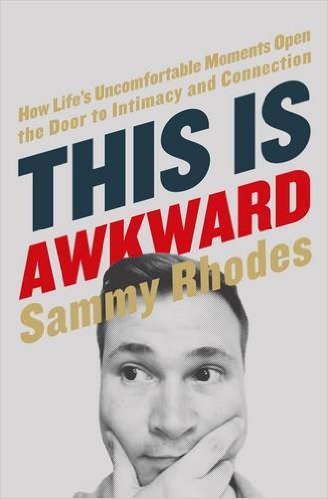While most of us would rather avoid awkward moments, some have learned to embrace them.
Sammy Rhodes, a well-known tweeter who serves as campus minister with Reformed University Fellowship at the University of South Carolina, is the author of the new book This Is Awkward: How Life’s Uncomfortable Moments Open the Door to Intimacy and Connection (Thomas Nelson) [excerpt]. Awkwardness highlights the gap, he contends, between who we are and who we should be, revealing “cracks in our humanity.” Covering uncomfortable subjects such as divorce, sexual sin, and introversion, Rhodes exhorts us:
Resign yourself to the awkwardness of God’s work of grace in you to begin to close that gap while simultaneously making you able to talk about it. Resign yourself to the awkwardness of life.
I asked Rhodes what advice he’d give to those battling depression, what it’s like being a comedian and campus minister, how he tweeted himself to death, and more.

You write,
I want to be vulnerable. In my best moments, I believe in grace. My hope for this book is that its awkwardness will itself be an invitation to the kind of vulnerability that can only happen if grace is true.
When did you discover that awkwardness can be opportunity to showcase grace?
I’ve always felt like an awkward person but never knew why. I knew I was an introvert, which is it’s own kind of shame. But it wasn’t until I read a little book on awkwardness by Adam Kostko that I connected the dots between awkwardness and shame.
All awkwardness is the gap between who we are and who we should be, and so behind almost every awkward moment is shame. And the only real antidote to shame is a God who sees that gap and comes and loves you where you are, not where you’ve been pretending to be.
“Some people major in business in college. I majored in depression.” What’s the best advice you’d give to someone navigating depression?
Talk about it. Find a pastor. Find a peer. Find a counselor. Find a doctor. And talk about it. Depression grows best in the dark, so you have to bring it into the light.
The crazy thing to me about the way we talk about mental illness is how much we don’t talk about it. We who affirm total depravity should have a broader category for the brokenness of the world. Sometimes our bodies are broken, and our bodies include our brain. Some of us need medicine. Antidepressants aren’t the anti-Christ. They’ve been tremendously helpful in my own life. So I want to do everything I can to normalize counseling and medicine. This is a real struggle many of us have, but have been afraid to talk about because the church has often been less Jesus and more Job’s “counselors.”
What practical word of hope would you offer to the believer who struggles with sexual sin?
Your sexual shame is no match for the grace of Jesus. In the words of Sinclair Ferguson (paraphrasing Puritan Richard Sibbes), “There is far more grace in the Lord Jesus than there is sin in you.” The Lord isn’t surprised by your struggle. That’s precisely why he went to the cross for you. But he’s also risen, which means there’s hope for you to change—even if it takes time. This is why Eugene Peterson called the Christian life a “long obedience in the same direction.” There are things you have to cut out of your life—relationships, unfiltered Internet access, smartphones. That’s the “cutting off the hand” and “ripping out your eye” word Jesus has for us (Matt. 5:30), which can be so hard to do.
The harder part, though, is figuring out what’s driving your sexual sin in the first place. I’ll never forget my counselor using an illustration with me about my own struggle with pornography:
Imagine you’re driving a car. One foot is on the brake. You’re trying to stop. Good. But what happens if the other foot stays on the pedal? You might stop for a while, but as soon as you lift your foot off the brake, your zooming off again into sexual struggle. How do you take your foot off of the pedal?
That’s the harder question. Why is it on the pedal? For me it was a combination of peer sexual abuse when I was younger that blossomed into pornography use in order to cope with life. I would also say, as a practical word of hope, there are all kinds of recovery groups. You’ll never work this out by yourself. Sin always wants to isolate. Healing always begins in community. Go get involved in a gospel-driven recovery group. It might save your life.
If someone approached you wanting to be a comedian and minister at the same time, what would you say?
I would say you cannot serve two masters. Believe me, I’ve tried.
That said, comedy has a lot to teach us about how to connect truth to people. That’s what the best comics do. They leave you laughing and thinking, That’s so true. We usually ask, Can you exegete? But exegesis and preaching aren’t the same thing. You can’t have good preaching without exegesis, but you can have good exegesis and preach a terrible sermon. So I’m all for learning from comedy in ways that help us connect to the hearts of our people both in preaching and in pastoring. Sometimes the most hopeful thing you can do with people is laugh.
How did you tweet yourself to death?
That’s a great and painful question. You can read the long version here. The short version is I started using humor on Twitter (@SammyRhodes) and it was a lot of fun. But as more people liked it and took notice it became more than fun. It became approval hunting, an unhealthy way of having my affirmation needs met. I remember being on vacation with my family and we were eating at one of those seafood restaurants with the brown paper covered tables. My phone had died so I took my kids’ crayons and was writing “funny” tweets on the table, while ignoring my family. That was rock bottom.
I’m thankful Jesus loves us enough to disappoint us. And I’m thankful, as painful as it was, that through all the accusations of plagiarism I was kind of forced off Twitter for a while and got to take a long, hard look at my own heart.
I’m also thankful death and resurrection are the norm in the life of a Christian. I hope this book is a kind of resurrection. We’ll see.
Related:
- Don’t Waste Your Awkwardness (Sammy Rhodes)
Is there enough evidence for us to believe the Gospels?
 In an age of faith deconstruction and skepticism about the Bible’s authority, it’s common to hear claims that the Gospels are unreliable propaganda. And if the Gospels are shown to be historically unreliable, the whole foundation of Christianity begins to crumble.
In an age of faith deconstruction and skepticism about the Bible’s authority, it’s common to hear claims that the Gospels are unreliable propaganda. And if the Gospels are shown to be historically unreliable, the whole foundation of Christianity begins to crumble.



































